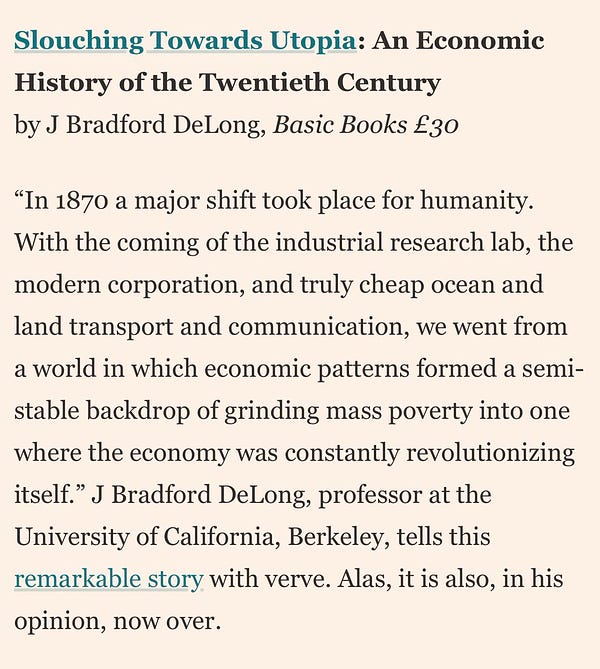The Roosevelt Institute-New Republic Felicia Wong-Michael Tomasky “How to Save a Country” Podcast, & BRIEFLY NOTED
For 2022-11-23 We
CONDITION: Over the Moon:
Martin Wolf <https://www.ft.com/content/634c1974-bc76-4f56-9548-274816dcc638> has chosen Slouching Towards Utopia: An Economic History of the 20th Century <bit.ly/3pP3Krk> as one of his Economics Books of the Year!:
“In 1870 a major shift took place for humanity. With the coming of the industrial research lab, the modern corporation, and truly cheap ocean and land transport and communication, we went from a world in which economic patterns formed a semi-stable backdrop of grinding mass poverty into one where the economy was constantly revolutionizing itself.” J Bradford DeLong, professor at the University of California, Berkeley, tells this remarkable story with verve. Alas, it is also, in his opinion, now over.
& Andrew Kelly says that it is not only “an important book built on many years of research and thinking”. It is “also a terrific read—a model for economics books.”


It is not letters of fire that inscribe themselves directly on the mind permanently via their Truth. It is almost surely not a treasure for all time—even though knowledge of the past is an aid to the interpretation of the future, which in the course of human things must resemble if it does not reflect it. But what it is, it is.
FOCUS: The Roosevelt Institute-New Republic Felicia Wong-Michael Tomasky “How to Save a Country” Podcast:
Felicia Wong, Mike Tomasky, & Brad DeLong: Why Neoliberalism Is Finally on the Way Out
<https://overcast.fm/+8Kaim2tl4>
Excerpts:
Brad: I still cannot believe that the New Deal order collapsed as rapidly as it did in the 1970s…. Enormous productivity growth and real wage increases.... [Yes,] inflationary and... productivity slowdown speed bump[s]… people… angry at bureaucracy… at unions that they saw as having... monop[sony]... power… [But that] shouldn’t have led to the... collapse within less than a decade of the most successful political economic system and order that the world had ever seen...
Brad: The bad neoliberalism... is: the market giveth, the market taketh away, blessed be the name of the market.... The belief that if property rights are cut at the joints, the market… crowdsources the problem of increasing production… mobilizes human brain power to making a richer world in a way no other system can. But... at a horrible price. A market system cannot provide any form of social justice, and if you demand that it be tweaked and managed to do so, that would wreck the market’s ability to do what it could.... This is Margaret Thatcher’s TINA... “there is no alternative”...
Brad: There was a left neoliberalism as well... the post–World War II system had become overbureaucratized... encrusted with rent-seeking… politically strong clients... [with] ]weak claims…p Aroperly constructed market economy crowdsources… solution[s]... [better than] bureaucrat[s]... or some central planner.... [as] people on the spot with the information are empowered to act and to act for the common good.... Left neoliberalism, of which I was once a card-carrying member... [saw itself as] a huge improvement over... the post–World War II generation [system]...
Brad: Left and... right neoliberals alternated, but... whenever we left neoliberals did something like balance the budget in the interest of faster economic growth, the right… promptly… fund[s] many more bigger tax cuts for the rich...
Brad: The neoliberal order persisted.... Its three promises... restore productivity growth... right the distribution of income by getting rid of various intermediar[ies with]... market and regulatory power... restore the moral center of life by making people realize that they could not [always] rely on the government… [if] they didn’t make good decisions…. It did absolutely none of those things. All it did was greatly widen income and wealth inequality…. And yet, it went… putting along… survived… the 1980s… the 1990s… comes roaring back in the 2000s, and no matter what you want to say about the end of the neoliberal order in the ashes of the fires caused by the Great Recession, I look around and it’s still there...
One Image:
One Video:
MUST-READ: The American Prospect’s “Blockchain Eight”
David Dayen: Congressmembers Tried to Stop the SEC’s Inquiry Into FTX: ‘The ‘Blockchain Eight’ wrote a bipartisan letter in March attempting to chill the SEC’s information requests to crypto firms. FTX was one of those firms: Tom Emmer (R-MN), whom the Republican caucus just elected as majority whip, the number three position in the House GOP leadership, led the letter.... “My office has received numerous tips from crypto and blockchain firms that SEC Chair Gary Gensler's nformation reporting ‘requests’ to the crypto community are overburdensome, don’t feel particularly … voluntary … and are stifling innovation.”... Byron Donalds (R-FL) said through a spokesperson that the congressman was not attempting to influence ongoing investigations at the SEC.... Jake Auchincloss (D-MA), another of the signatories, told the Prospect, “The congressman has been clear from day one that crypto needs strong and clear laws from Congress. The SEC will need to explain to Congress why, despite claiming that it didn’t need new laws for exchanges, it failed to foresee this meltdown.”... []Also] Warren Davidson (R-OH), Ted Budd (R-NC), Darren Soto (D-FL), Josh Gottheimer (D-NJ), and Ritchie Torres (D-NY). Budd was elected this year to the U.S. Senate...
Oþer Things Þt Went Whizzing by…
Very Briefly Noted:
Nouriel Roubini: MegaThreats: Ten Dangerous Trends That Imperil Our Future, And How to Survive Them: The Say More interview. Read now….
Josh Zumbrun: Inflation and Unemployment Both Make You Miserable, but Maybe Not Equally: ‘For nearly 50 years, the so-called Misery Index has added the unemployment rate to the inflation rate as a gauge of Americans’ mood…
Steve M.: Republicans Sound Like Stochastic Terrorists Even When They're (Apparently) Not Trying to: ‘How much is Pompeo adding to this atmosphere or rage? Okay, probably not much, because the only people who seem to care about his campaign are journalists naive enough to believe that someone other than Donald Trump or Ron DeSantis will be the 2024 Republican presidential nominee…
Joan Williams: How you treat the ‘non-elite’ is key to beating populism: ‘In Pennsylvania, John Fetterman bridged the ‘representation gap’ between the concerns of elite and middle-class voters…
Robert Armstrong: Sam Bankman-Fried and the power of dressing badly: ‘Looking attractive matters a lot less, for political or professional purposes, than telling your story…
Gary Marcus: How come smart assistants have virtually no ability to converse, despite all the spectacular progress with large language models?: ‘5 reasons why Large Language Models like GPT-3 couldn’t save Alexa…
Mark Bowden: The Tiny and Nightmarishly Efficient Future of Drone Warfare: ‘Russia’s war on Ukraine has given us just a peek of the world to come…
Derek Thompson: The housing market has gone from bad to worse…
¶s:
Suresh Naidu: Is There Any Future for a US Labor Movement?: ‘US union density remains low, even as unions remain popular. This is because employer opposition and US labor law together imply that workers need to overcome substantial collective action problems at work in order to win union recognition and collective bargaining agreements. These barriers make dense social networks and high levels of social capital at work a prerequisite for unionization. Labor organizing… faces an uphill battle without policy changes that extend collective bargaining across employers and up the value-chain...
Annie Lowrey: The U.S. Needs More Housing Than Almost Anyone Can Imagine: ‘No one can say just what it would take to make Brooklyn affordable for workers who don’t have a college degree, render San Francisco accessible to families with kids and elderly couples on fixed incomes, or allow extended-family members in Boston to buy apartments within a few blocks of one another. That means we have no policy vision of how to make our biggest, most productive places affordable for all, and no plan to get there…
Steve Clemons: A Trump spoiler alert: ‘As an opening act of his possible 2024 bid, Mike Pompeo called out AFT President Randi Weingarten as the most dangerous person in the world—more than Chinese premier Xi Jinping! He laid it out for David Weigel and Shelby Talcott after attending the Republican Jewish Coalition conference in Las Vegas this weekend. I asked Weingaraten for her response, and she said Pompeo was “desperate to be labeled as the extremist in the Republican presidential primary”…
Adam Serwer: Rebelling Against Trump Is Not the Same as Rebelling Against Trumpism: ‘Fox News, typically a geyser of Trump worship, spent the aftermath of the midterms promoting Florida Governor Ron DeSantis, who possesses Trump’s authoritarian instincts but fewer personality defects. National Review published an editorial saying that Trump should not run for president again…. We’ve seen Republicans try to distance themselves from Trump before…. And they always come crawling back. As long as Trump is seen as helping Republicans politically, he can shoot as many people on Fifth Avenue as he likes…








You wonder how Neoliberals took over from the New Deal coalition so quickly. I would say there were a few contributors to that but the main one is Nixon's realization (based on watching George Wallace) that after the Civil Rights acts racism was the cheat code for American politics. That is the fulcrum that conservatives tried to use against Roosevelt and the New Deal but mostly failed. Nixon had an easier time because the cracks in our economic and foreign policies started to become more pronounced in the 60s and early 70s, and the various liberation movements created a lot of unease amongst small c conservative Americans - especially labor union members. A mixture of racism, Calvinism and a taste for authoritarianism became the foundation of the Reagan coalition and the Republican party.
Regarding the map, I've come to the conclusion over the years that pre-Persian Wars Greece should be thought of as an empire - a decentralized one to be sure (perhaps the post-WWII "American Empire" is another example), but an empire nonetheless. Without colonization, my guess goes, core Greece could not have accommodated or fed its expanding population. A second guess is that the Greeks were perceived as aggressive enough that one can imagine much of the motivation of the Persian-Carthaginian campaign of 480 as preemptive, let's-attack-while-we-can.